Reception
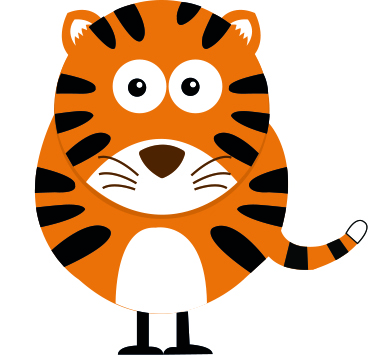
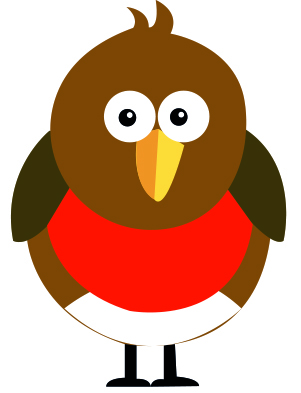
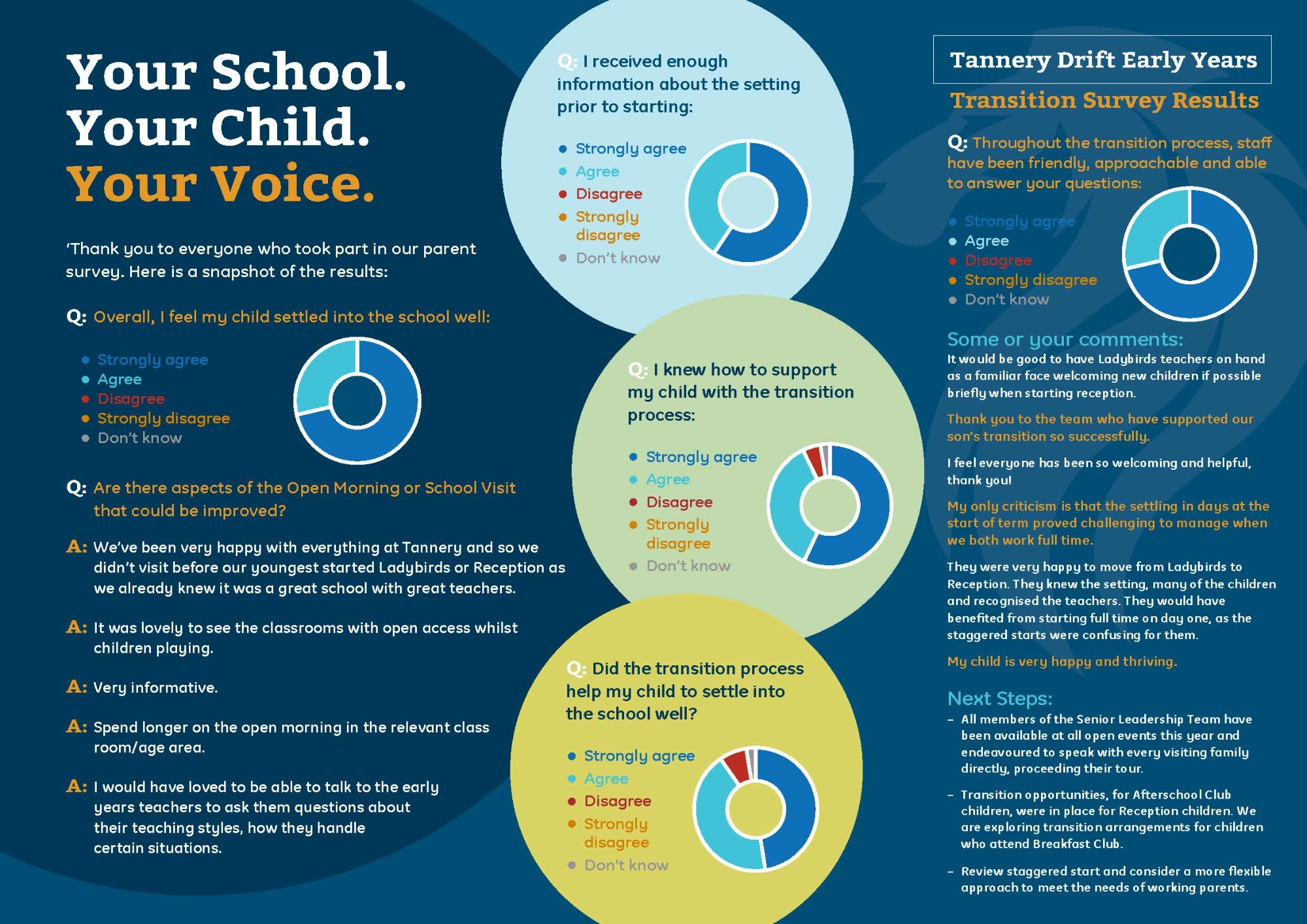
In Red Robins Class and Little Tigers Class we learn through play. The environment and resources enable children to make choices and explore different objects and learning opportunities independently. We respond to children’s interests and fascinations and plan to enhance their learning by introducing new experiences the children may not have previously encountered. The classrooms have established routines to support children to navigate their school day successfully. Supportive adults encourage children to develop their resilience to allow them to keep on trying when they find something difficult and to bounce back when they encounter any difficulties. Children are encouraged to become problem solvers who use their existing knowledge to make links and develop their ideas and thinking. Children are supported to come up with their own ideas, and adults enable them to further develop these through questioning and appropriate modelling.
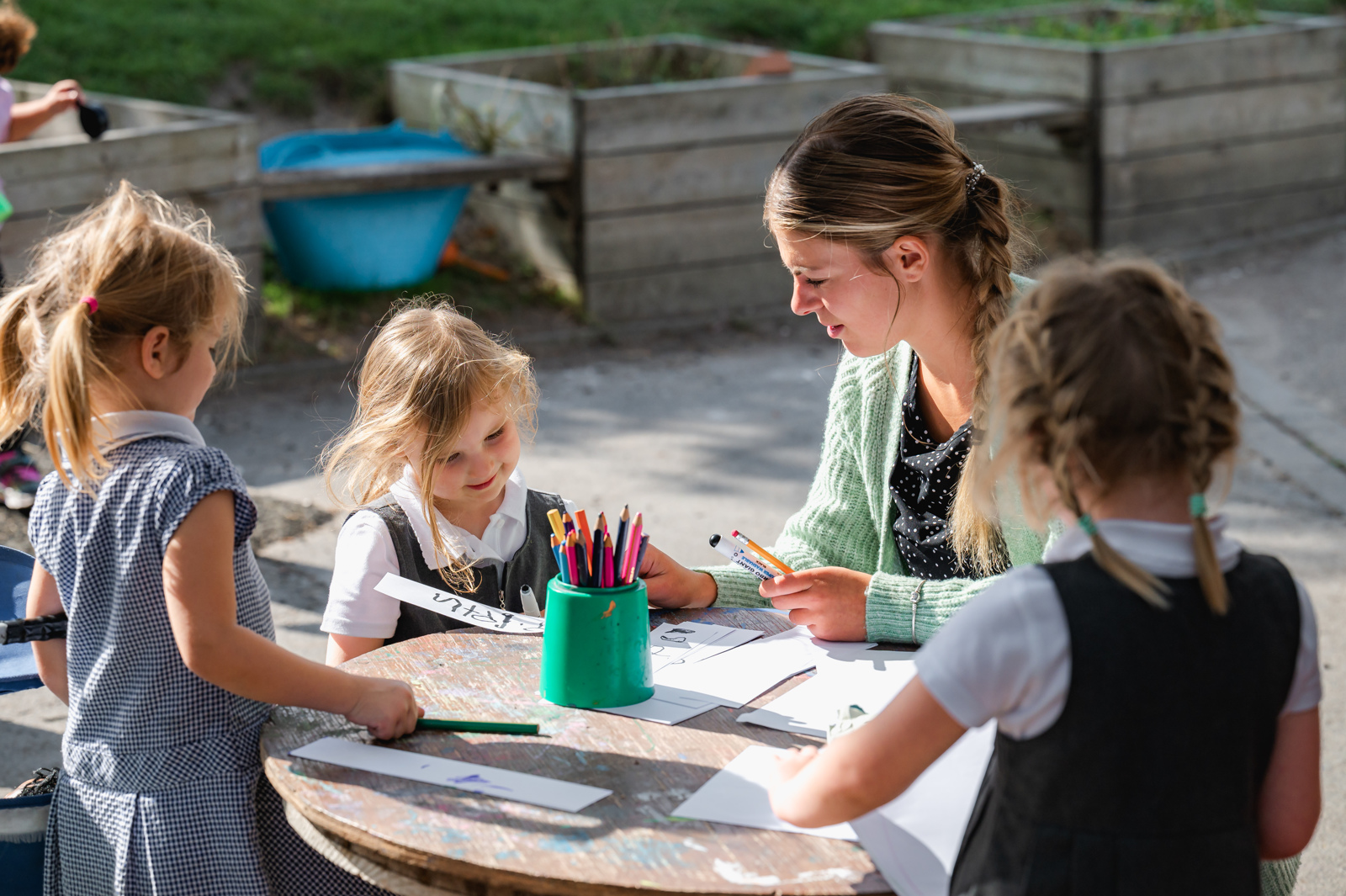
We have a fantastic indoor and outdoor environment that excites the children's interests and inspires new learning through play. We set up resources and equipment that promote all areas of learning, following the Early Years Curriculum as well as the needs and interests of the children. Our two Reception classes share a large classroom space, where the children can investigate materials in the workshop area, read stories, play musical instruments, draw and paint, explore sand and water, build and construct, and develop their imaginations through role play and small world characters. In our garden area, there are opportunities for the children to let their imaginations flourish on a bigger scale, and make larger constructions using wooden blocks, planks and other materials, as well as a large sandpit and a mud kitchen. Alongside this, we promote appropriate risk-taking on our exciting climbing and balancing equipment.
Carefully planned, purposeful and creative activities support the children to learn mathematical language and skills, and daily phonics sessions equip children with early literacy skills essential for reading and writing throughout the year.
We visit our outdoor wildlife area at the edge of the school field, exploring natural resources and investigating the world around us. We encourage the children to play outside as much as possible, dressed appropriately for all weathers!
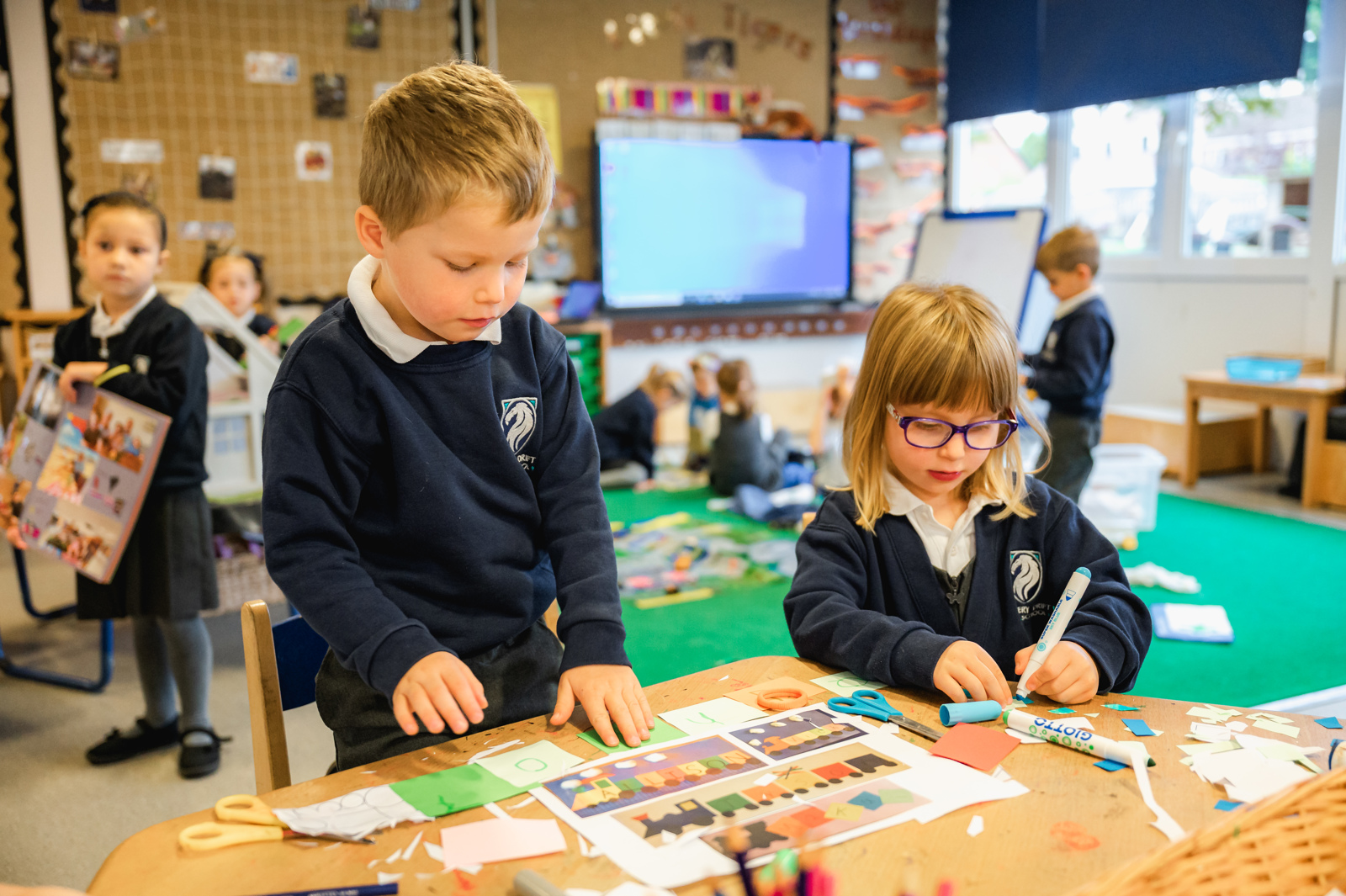
Our balance of play, whole class teaching sessions and adult led small group work aims to capture the children’s interests, develop their curiosity and allow them time to learn and consolidate key skills. This approach ensures our pupils are happy and confident in their environment, as well as motivated and enthusiastic learners.
We strive to create a welcoming and safe environment where children feel comfortable and can share their experiences. We aim to fire children’s curiosity and imagination, offering them new and varied activities that inspire young inquisitive minds.
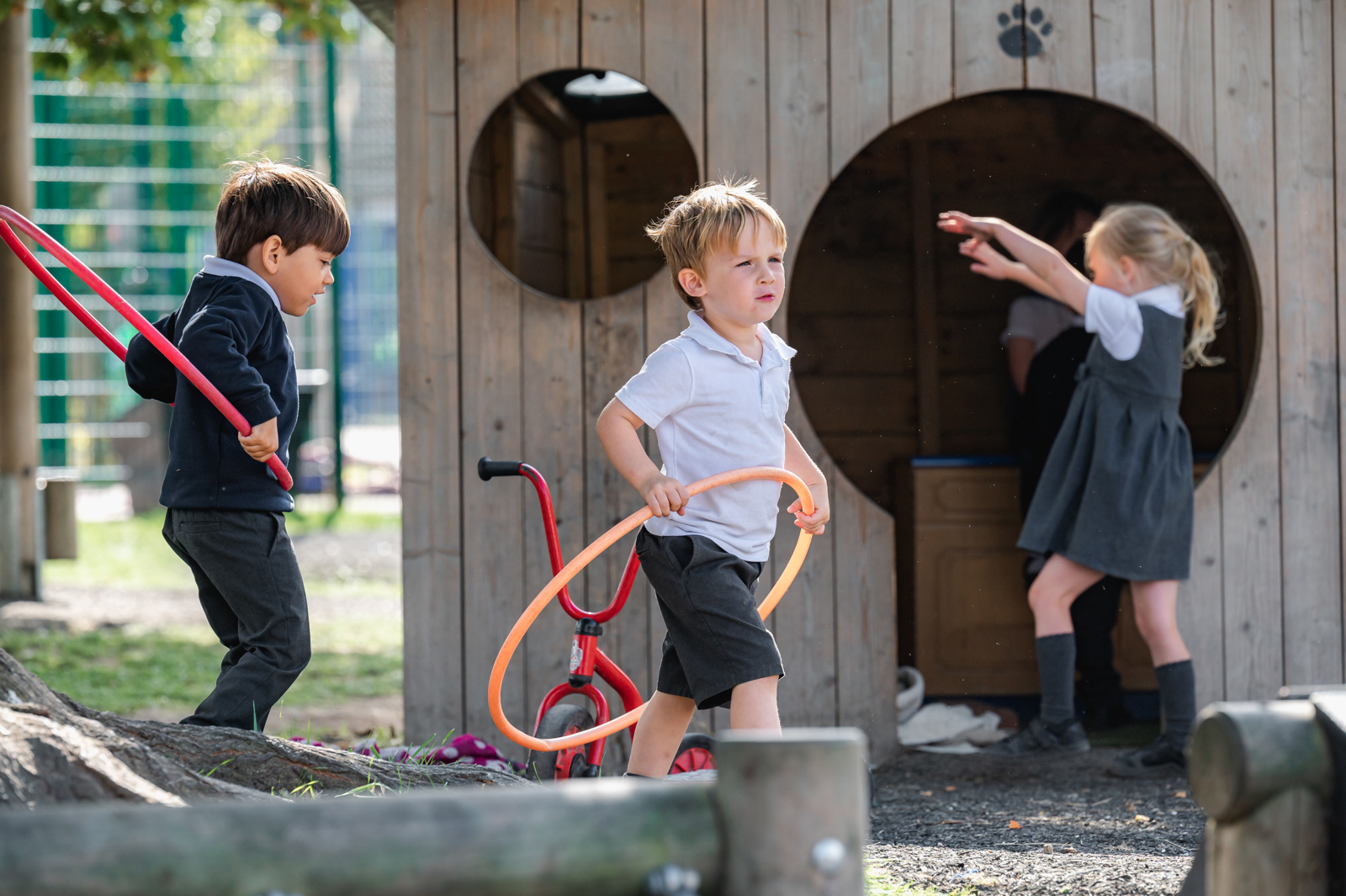
There are 7 different areas of learning and development, that we target across all areas of the setting, both inside and out:
Personal, Social, Emotional Development
-
Adults support children to transition into the Reception classes to enable them to be settled and happy within the classroom, so they are ready to learn.
-
Modelling supports children to become compassionate and to regulate their behaviour according to their own needs and the needs of others.
-
Opportunities for children to practise following instructions involving several ideas are embedded within the classrooms.
-
Children are empowered to become confident to try new activities independently and to show resilience and a growth mindset when doing so.
-
Discussions, modelling and stories allow the school rules to become embedded in the classroom and for children to develop an understanding of why these exist and to identify between right and wrong choices.
-
Children are supported to form positive relationships with adults and their peers and to show empathy towards others.
-
Discussions and snack times allow children to understand healthy food choices.
-
Children are supported to manage their own basic hygiene and self-care needs.
Communication and Language
Our daily routines and learning opportunities allow plentiful opportunities for children to be exposed to a range of vocabulary and to develop their communication and listening skills. Children are encouraged to be active learners during whole class lessons and small group activities through providing relevant questioning, comments and actions.
Adults react to children’s fascinations and queries to develop their conversational skills and to further develop their understanding.
Children are encouraged to communicate in full sentences and the correct use of tenses and conjunctions is modelled to allow children to further develop their spoken communication.
Physical Development
Physical development is embedded across the environment with a range of opportunities provided for children to develop their gross and fine motor skills. Through PE sessions and use of equipment in the outdoor environment, children are provided with opportunities to develop their gross motor skills, balance and co-ordination. Children are exposed to a range of ways of moving and are taught to negotiate space safely.
Planned fine motor activities alongside opportunities to use a range of classroom equipment such as scissors, cutlery and paintbrushes allow children to develop their strength and precision. Adults demonstrate and support children to use a correct pencil grip to assist their developing writing.
Literacy
We promote a love of literature in Reception, through sharing stories during play as well as a daily story-time. Our adult led learning is often based around a book to inspire children’s learning. Daily phonics lessons develop children’s knowledge of phonemes and the corresponding graphemes. Adults model how to apply phonics skills to blend words to read and support children to read simple sentences independently. Children are exposed to tricky words and repetition supports them to recognise these on sight. During discussions when reading, new vocabulary is explored, and children are encouraged to demonstrate an understanding of what they have read. This is further supported through opportunities to apply their understanding during child led learning.
Children are provided with opportunities to apply their fine motor skills to write recognisable letters, learning the correct formation for these. Carefully planned opportunities, based upon children’s interests, allow children to apply their phonics skills to segment words and to write simple captions and sentences. Adult modelling and support and resources available in the environment allow children to develop their confidence to communicate through written means.
Mathematics
Mathematical discussions happen throughout the day within the environment for example when counting out snack, comparing the height of their construction towers or using shapes to make pictures. Children are exposed to correct mathematical language and are supported to use this independently. Through the use of manipulatives, children are assisted to develop a deep understanding of how numbers to 10 are composed. This allows children to develop an automatic recall of some number facts. Children are taught to subitise quantities up to 5 through games, songs and questioning during play. Exposure to numbers to 20 allows children to become more fluent with the counting system. Discussions during maths lessons, small groups and individually during play allow children to make comparisons between totals. Reflecting on patterns in the world around us, provides a stimulus to explore patterns within numbers including odd and even numbers, doubling and sharing.
Understanding the World
We use children’s own experiences as a starting point to discuss the world around them and how their lives compare to those of other people. Real life examples allow children to compare and contrast their lives to those of people in the past. We observe various religious and cultural celebrations, allowing children to immerse themselves in these. Discussions allow children to compare similarities and differences between these and their own lives.
We use our surrounding natural environment to explore changes and processes in the natural world. Children are provided with the opportunities to make detailed observations and drawings of animals and plants. We use relevant examples to compare and contrast our own and other environments.
Expressive Art and Design
Children’s interests and existing talents are nurtured through access to a range of art and craft materials and opportunities. They are taught to safely use and explore a range of techniques, tools and materials to create outcomes for a specific purpose to meet their own aims. A culture of celebration is promoted allowing children to share their work and to appreciate the work of others. Children’s imaginations are further developed through the use of props and prompts to support their role play and small world play both using familiar and new experiences. Music, singing and instruments are explored to put on performances, as enhancements in play and through some small group sessions.
The Reception team is made up of our two teachers Miss Cottle and Ms McNeill who are supported by a team of highly skilled and passionate Early Years support staff.
Click here to see the assessment framework for Early Years Foundation Stage (EYFS).


